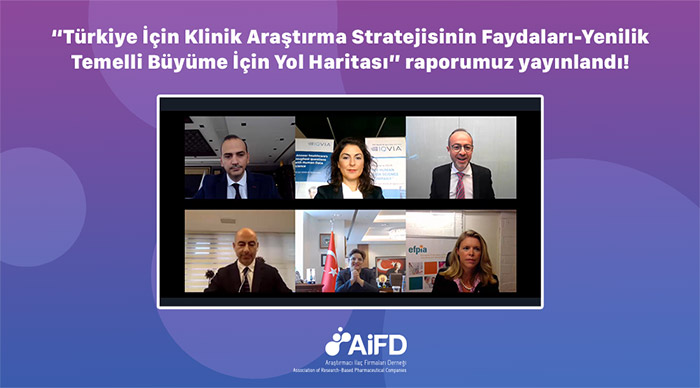Support of innovation in the field of pharmaceuticals is one of the most salient value propositions made by AIFD to the Turkish society and economy. When we analyse pharmaceutical R&D investments that forms the most important element of the value chain, we realise that out of the global R&D investments amounting to 180 billion US dollars, 61% are allocated to the clinical trials.
It is plausible to obtain stunning results in clinical trials within the short term span of 3 to 5 years and to bring Turkey rapidly to higher echelons in the international competition. There is an intense competition among countries to get a larger share from the global clinical trials market worth USD 110 billion annually. Therefore, in the pharmaceutical value chain it is proposed to strategically focus as a first step on clinical trials, in order to create with the shared wisdom of the private and public sectors a model that would create a leap forward similar to South Korea’s advance in the last 10 years.
Based on this opportunity and need, AIFD finalized a very important report project in 2019. The survey conducted by IQVIA, a reputable international consulting firm, under the coordination of AIFD and with the contribution of EFPIA, delivered a report highlighting 'the importance and contribution of clinical trials conducted in Turkey’, comparing the data with the world data. In the study, three main benefits of clinical trials in terms of economic, scientific progress and early access of patients to innovative treatment were examined. As a result of a participatory process including a large multi-stakeholder workshop, 12 development areas were identified in the report.
The launch of the report planned for March 2020 was delayed due to the Covid-19 pandemic. "Benefits of a Clinical Research Strategy for Turkey – a Roadmap for Innovation-driven Growth" report was shared with the public during the TUSEB Biotechnology Symposium on September 17, 2020. Keynote speeches during the launch of the report were delivered by Prof. Dr. Emine Alp Meşe, Deputy Minister of Health; Assoc. Prof. Tolga Tolunay, Director of the Turkish Pharmaceuticals and Medical Devices Agency (TİTCK); Dr. Mete Hüsemoğlu, Chairperson of the AIFD Board of Directors and Ms. Nathalie Moll, Director General of EFPIA.

Following the presentation of the report by Ms. Şule Sencer Akbil, IQVIA Engagement Manager, a panel titled, "Importance of Clinical Trials for Turkey and What Kind of a Joint Working Model is Needed to Implement a Roadmap?” was organised. Prof. Dr. Ahmet Gül from Istanbul Univ. Medical School was the moderator of the panel where Ms. Nihan Burul Bozkurt, TITCK Clinical Trials Department Head; Mr. Kutluhan Taşkın, from Presidency of the Republic of Turkey, Directorate of Strategy and Budget, General Manager of Plans & Programs; Dr. Hasan Arslan, Deputy General Manager of Public Hospitals, Ministry of Health; Prof. Dr. İlhan Satman, Board Member of the Turkey Institutes of Health and Mr. Özgür Ertok, Country Manager of IQVIA Consulting took part as panelists.
 Mr. Özgür Ertok, Country Manager of IQVIA Consulting, stated that "We observe that currently 139 million US dollars worth of foreign investment is chanelled to Turkey for clinical trials and contributes directly to the macroeconomic balance which is one the major objectives of the New Economic Plan. Considering the size of the world market and the potential of Turkey in conducting clinical trials, we realise that planning and the creation of an ecosystem are necessary to raise this investment in the first phase to USD 500 million and in the second phase to USD 1 billion.”
Mr. Özgür Ertok, Country Manager of IQVIA Consulting, stated that "We observe that currently 139 million US dollars worth of foreign investment is chanelled to Turkey for clinical trials and contributes directly to the macroeconomic balance which is one the major objectives of the New Economic Plan. Considering the size of the world market and the potential of Turkey in conducting clinical trials, we realise that planning and the creation of an ecosystem are necessary to raise this investment in the first phase to USD 500 million and in the second phase to USD 1 billion.”
During the online press conference held after the launch, AIFD Chairperson Dr. Mete Hüsemoğlu made the following statement: “As research-based pharmaceutical companies, our main mission is to work with all our stakeholders to ensure the access of patients in Turkey to the latest treatments. Clinical research, which enables us to understand the effect and safety of newly developed medicines and treatments on humans, is vital for human health. Our country has a significant clinical research capacity. One of the main findings of our report, which we are happy to share with the public, is that clinical research generates high added value in the fields of economy, health and science. Policies that we can implement with public-private sector cooperation can make our country one of the most important actors in the world in clinical research, as well as establish an ecosystem that feeds other valuable links of the pharmaceutical value chain such as basic research, production and export. We believe that our report will be an important roadmap for all stakeholders towards this process."
Main messages from the “Benefits of a clinical research strategy for Turkey – A roadmap for innovation driven growth” Report
“Clinical trials, which are defined as scientific studies conducted with the participation of volunteers and aiming to obtain medical information, are among the most important processes that ensure the effectiveness and safety of newly released medicines for human use. The report aimed to investigate the value of clinical research in Turkey and to define the conditions necessary to increase investments in clinical research in Turkey in the medium term; it is based on a survey conducted with the participation of 17 AIFD member companies and covers the pharmaceutical sector in Turkey, the trends in global R&D investments and clinical research, it provides important data and insights on the role of clinical trials in Turkey on the economic, scientific and public health dimensions, as well.
The report highlights the following findings:
Well over 21 thousand patients are treated in clinical trials in Turkey.
Clinical trials reduced the financial drug burden on SSI (SGK) by USD 41.8 million.
Clinical research provides the transfer of global knowledge to Turkey.
The report recommends 12 steps in several areas to increase the number of clinical trials in Turkey
After the launch, it is planned to hold under the leadership of TITCK and TUSEB a series of workshops with the participation of relevant parties in the clinical studies ecosystem, and to prepare an action plan to implement the recommendations in the report.

